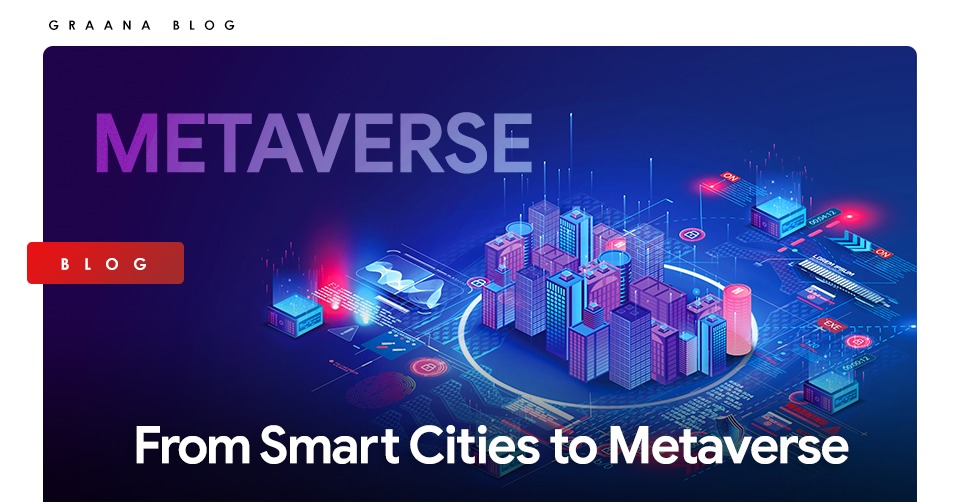
In the race towards the future, governments had been making efforts for smart cities until they encountered ‘metaverse’. Cities, particularly in developing countries, are transitioning from analogue/conventional platforms to digital platforms. However, as ‘metaverse’ is going to be the new ecosystem for various interactions and a new target for various cities and states to accomplish. It seems that innovations in technology will keep on providing cities with new goals and the quest for attaining new targets will continue. It will not be long until our surroundings will be marked by the presence of robots and the marvels of Artificial Intelligence (AI).
Graana.com through this blog highlights a phenomenon ‘From Smart Cities to Metaverse’, a phenomenon that represents the transition of cities from smart cities (powered by the internet) to the hypothetical yet real cities powered by Augmented and Virtual Reality (AR/VR).
What defines metaverse is the creation of virtual spaces which incorporates the substantial use of virtual and augmented reality to create a parallel universe. Metaverse is the merger of physical and virtual worlds. The multiverse will be known for the hefty usage of Artificial Intelligence, Big Data and Digital Twins for interacting in the new virtual spaces. The concept is edging closer to reality and once it reaches its final stages the inhabitants of the cities will live in a virtual world. South Korea has created hype after the mayor of City Seoul through its digital avatar announced that Seoul is developing a comprehensive plan for becoming a part of the metaverse. The local government of the city has the ambition of attaining ‘contactless communication’ by the end of 2022.
Metaverse will be no less than a movie scene, imagine your digital twin or your digital avatar going to work or visiting a public office on your behalf. Cities will altogether have a new definition where people will be meeting and communicating virtually. Without visiting the physical spaces, a person will be able to wander through streets and visit places at long distances only by wearing a headset for wandering in the metaverse. Developing cities in the metaverse requires loads of data to be brought into a digital form along with the help of GIS mapping. In these hypothetical cities, a person will be virtually present without being present in the actual space.
Tourism is one of the tools for revenue generation with the metaverse knocking at the doors. People will be able to visit their favourite places from home. Virtual London, a project closer to the multiverse has mimicked the London city using the information of 3.6 building blocks and covering an area of 1600 kilometres. Following the same model, a person can easily access its favourite tourism spot while sitting at home. Another privilege that metaverse provides relates to the regeneration of old historical sites, for example by using Artificial Intelligence (AI) the cities that have been destroyed as a result of war or a natural disaster can be recreated. Tourists are particularly attracted to historical sites; the appetite of people’s curiosity can be addressed in the multiverse.
One of the beneficiaries of the metaverse is going to be the real estate sector since it will offer transparent real estate transactions to the people. Parcels of land supported by GIS information systems backed by the data of the government will ensure transparency in the process. Similarly, a person will be able to virtually visit the place prior to closing the deal, and once the deal is locked there will be no need to lodge strenuous paperwork since the information could be easily driven from the digital identities.
In the metaverse, assets will shift from physical to the virtual domain. The virtual assets will be bought and sold using cryptocurrency which will replace fiat currency. ‘Decentraland’ is the online space that has sold a virtual asset for $2.4mn worth of cryptocurrency. The phenomenon of buying and selling virtual assets is picking up the pace as metaverse is ready to take on the world. Those who keep a keen eye on the role of technology and real estate are speculating that a new PropTech wave can be around the corner.
ISLAMABAD: The federal government is set to inaugurate the Islamabad Information Technology Park on August…
Lahore, April 23, 2025 – The city of Lahore has successfully completed the construction of…
ISLAMABAD, Pakistan – April 23, 2025 – Chaaye Khana, Pakistan's popular cafe renowned for its…
ISLAMABAD: Prime Minister Shehbaz Sharif laid the foundation stone for the Murree Road underpass on…
DUBAI: Pakistani real estate developers and representatives showcased a range of commercial and residential investment…
ISLAMABAD: Capital Development Authority (CDA) is currently undertaking a major Rs652 million project to upgrade…